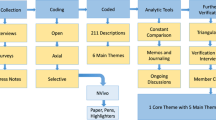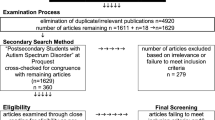Abstract
Mentoring is often recommended to universities as a way of supporting students with Autism Spectrum Disorders (ASD) and/or mental health conditions (MHC), but there is little literature on optimising this support. We used mixed-methods to evaluate mentees’ and mentors’ experiences of a specialist mentoring programme. Mentees experienced academic, social and emotional support, although subtle group differences emerged between students with ASD and MHC. The quality of the mentee-mentor relationship was especially important. Mentors also reported benefits. Thematic analysis identified that effective mentoring requires a tailored partnership, which involves a personal relationship, empowerment, and building bridges into the university experience. Mentoring can effectively support students with ASD and/or MHC, but this is highly dependent on the development of tailored mentee-mentor partnerships.



Similar content being viewed by others
References
AGCAS Disability Task Group. (2014). What happens next? A report on the first destinations of 2014 disabled graduates. Sheffield: AGCAS Disability Task Group
American Psychological Association. (2013). Diagnostic and statistical manual of mental disorders (DSM-V). Arlington: American Psychiatric Association.
Ames, M., McMorris, C., Alli, L., & Bebko, J. (2015). Overview and evaluation of a mentorship program for university students with ASD. Focus on autism and other developmental disabilities. doi:10.1177/1088357615583465.
Andrews, B., & Wilding, J. (2004). The relation of depression and anxiety to life-stress and achievement in students. British Journal of Psychology, 95(4), 509–521. doi:10.1348/0007126042369802.
Baird, G., Simonoff, E., Pickles, A., Chandler, S., Loucas, T., Meldrum, D., & Charman, T. (2006). Prevalence of disorders of the autism spectrum in a population cohort of children in South Thames: The Special Needs and Autism Project (SNAP). The Lancet, 368(9531), 210–215. doi:10.1016/s0140-6736(06)69041-7.
Beardon, L., Martin, N., & Woolsey, I. (2009). What do students with AS and HFA want at college or university? (In their own words). GAP, 10(2), 35–43.
Braun, V., & Clarke, V. (2006). Using thematic analysis in psychology. Qualitative Research in Psychology, 3(2), 77–101. doi:10.1191/1478088706qp063oa.
Breslau, J., Lane, M., Sampson, N., & Kessler, R. (2008). Mental disorders and subsequent educational attainment in a US national sample. Journal of Psychiatric Research, 42(9), 708–716. doi:10.1016/j.jpsychires.2008.01.016.
Brugha, T. S., McManus, S., Bankart, J., Scott, F., Purdon, S., Smith, J., ... Meltzer, H. (2011). Epidemiology of autism spectrum disorders in adults in the community in England. Archives of General Psychiatry, 68(5), 459–465. doi:10.1001/archgenpsychiatry.2011.38.
Brumariu, L., Obsuth, I., & Lyons-Ruth, K. (2013). Quality of attachment relationships and peer relationship dysfunction among late adolescents with and without anxiety disorders. Journal of Anxiety Disorders, 27(1), 116–124. doi:10.1016/j.janxdis.2012.09.002.
Cai, R., & Richdale, A. (2016). Educational experiences and needs of higher education students with Autism Spectrum Disorder. Journal of Autism and Developmental Disorders, 46(1), 31–41. doi:10.1007/s10803-015-2535-1.
Castaneda, A. E., Tuulio-Henriksson, A., Marttunen, M., Suvisaari, J., & Lönnqvist, J. (2008). A review on cognitive impairments in depressive and anxiety disorders with a focus on young adults. Journal of Affective Disorders, 106(1–2), 1–27. doi:10.1016/j.jad.2007.06.006.
Centers for Disease Control and Prevention. (2009). Prevalence of Autism Spectrum Disorders. Morbidity and mortality weekly report, (Vol. 58) Atlanta: Centers for Disease Control and Prevention
Centers for Disease Control and Prevention. (2014). Prevelance of autism spectrum disorder among children aged 8 years—Autism and Developmental Disabilities Monitoring Network. Surveillance Summaries. (Vol. 63, pp. 1–22), Atlanta: Centers for Disease Control and Prevention
Charman, T., Pickles, A., Simonoff, E., Chandler, S., Loucas, T., & Baird, G. (2011). IQ in children with autism spectrum disorders: Data from the Special Needs and Autism Project (SNAP). Psychological Medicine: A Journal of Research in Psychiatry and the Allied Sciences, 41(3), 619–627. doi:10.1017/s0033291710000991.
Chester, A., Burton, L. J., Xenos, S., & Elgar, K. (2013). Peer mentoring: supporting successful transition for first year psychology undergraduate students. Australian Journal of Psychology, 65, 30–37. doi:10.1111/ajpy.12006.
Crawford, A. M., & Manassis, K. (2011). Anxiety, social skills, friendship quality, and peer victimization: An integrated model. Journal of Anxiety Disorders, 25(7), 924–931. doi:10.1016/j.janxdis.2011.05.005.
Dearden, J. (1998). Cross-age peer mentoring in action. Educational Psychology in Practice, 13, 250–257. doi:10.1080/0266736980130406.
Dennis, M., Lazenby, A., & Lockyer, L. (2001). Inferential language in high-function children with autism. Journal of Autism and Developmental Disorders, 31(1), 47–54. doi:10.1023/a:1005661613288.
Department for Business Innovation & Skills. (2015a). Consultation on targeting funding for disabled students in Higher Education from 2016/17 onwards. London: Department for Business Innovation & Skills
Department for Business Innovation & Skills. (2015b). Government response: Consultation on targeting funding for disabled students in Higher Education from 2016/17 onwards. London: Department for Business Innovation & Skills
DuBois, D. L., & Neville, H. A. (1997). Youth mentoring: Investigation of relationship characteristics and perceived benefits. Journal of Community Psychology, 25(3), 227–223. doi:10.1002/(SICI)1520-6629.
Eisenberg, D., Gollust, S., Golberstein, E., & Hefner, J. (2007). Prevalence and correlates of depression, anxiety, and suicidality among university students. American Journal of Orthopsychiatry, 77(4), 534–542. doi:10.1037/0002-9432.77.4.534.
Elsabbagh, M., Divan, G., Koh, Y., Kim, Y., Kauchali, S., Marcín, C., ... Fombonne, E. (2012). Global prevalence of autism and other pervasive developmental disorders. Autism Research, 5(3), 160–179. doi:10.1002/aur.239.
Equality Change Unit. (2014). Equality in higher education: statistical report 2014. Part 2: students. London: Equality Change Unit
Fombonne, E., & Chakrabarti, S. (2001). No evidence for a new variant of measles-mumps-rubella–induced Autism. Pediatrics, 108(4), e58. doi:10.1542/peds.108.4.e58.
Gelbar, N., Smith, I., & Reichow, B. (2014). Systematic review of articles describing experience and supports of individuals with Autism enrolled in college and university programs. Journal of Autism and Developmental Disorders, 44(10), 2593–2601. doi:10.1007/s10803-014-2135-5.
Hamilton, J., Stevens, G., & Girdler, S. (2016). Becoming a mentor: The impact of training and the experience of mentoring university students on the Autism Spectrum. PLoS ONE, 11(4), e0153204. doi:10.1371/journal.pone.0153204.
Harmer, B., Huffman, J., & Johnson, B. (2005). Clinical peer mentoring: partnering BSN seniors and sophomores on a dedicated education unit. Nurse Educator, 36(5), 197–202. doi:10.1097/NNE.0b013e3182297d17.
Higher Education Statistics Agency. (2016). Students in higher education institutions: Students, qualifiers and staff data tables. Retrieved 19th July 2016, 2016, from http://www.hesa.ac.uk/index.php/content/view/1973/239/.
Hill, R., & Reddy, P. (2007). Undergraduate peer mentoring: An investigation into processes, activities and outcomes. Psychology Learning & Teaching, 6(2), 98–103. doi:10.2304/plat.2007.6.2.98.
Hysenbegasi, A., Hass, S., & Rowland, C. (2005). The impact of depression on the academic productivity of university students. The Journal of Mental Health Policy and Economics, 8, 145–151. doi:10.1176/ps.2009.60.9.1257.
James, A. I. (2014). Cross-age mentoring to support A-level pupils’ transition into higher education and undergraduate students’ employability. Psychology Teaching Review: Special Issue: Pedagogical Action Research, 20(2), 79
James, A. I., Smith, P. K., & Radford, L. (2014). Becoming grown-ups: a qualitative study of the experiences of peer mentors. Pastoral Care in Education, 32(2), 104–115. doi:10.1080/02643944.2014.893008.
Kim, S., Oliveri, D., Riingen, M., Taylor, B., & Rankin, L. (2013). Randomized controlled trial of graduate-to-undergraduate student mentoring program. Journal of Professional Nursing, 29(6), e43–e49. doi:10.1016/j.profnurs.2013.04.003.
Martin, I., & McDonald, S. (2004). An exploration of non-literal language problems in individuals with Asperger syndrome. Journal of Autism and Developmental Disorders, 34(3), 311–312. doi:10.1023/B:JADD.0000029553.52889.15.
Mavropoulou, S., & Avramidis, E. (2012). Befrienders to persons in the autistic spectrum in Greece: What support do they offer and what challenges they face? European Journal of Special Needs Education, 27(3), 337–353. doi:10.1080/08856257.2012.691230.
Mazefsky, C., Folstein, S., & Lainhart, J. (2008). Overrepresentation of mood and anxiety disorders in adults with autism and their first-degree relatives: What does it mean? Autism Research, 1(3), 193–197. doi:10.1002/aur.23.
Mazzone, Luigi, Ruta, Liliana, & Reale, Laura. (2012). Psychiatric comorbidities in asperger syndrome and high functioning autism: diagnostic challenges. Annals of General Psychiatry, 11, 16–16. doi:10.1186/1744-859X-11-16.
Mentoring and Befriending Foundation. (2011). National peer mentoring anti-bullying pilot 2008–10: A report setting out the main findings from the national peer mentoring anti-bullying pilot 2008–10. London: Mentoring and Befriending Foundation
Rajuan, M., Tuchin, I., & Zuckermann, T. (2011). Mentoring the mentors: First-order descriptions of experience-in-context. The New Educator, 7(2), 172–190. doi:10.1080/1547688X.2011.574592.
Simonoff, E., Pickles, A., Charman, T., Chandler, S., Loucas, T., & Baird, G. (2008). Psychiatric disorders in children with Autism Spectrum Disorders: Prevalence, comorbidity, and associated factors in a population-derived sample. Journal of the American Academy of Child & Adolescent Psychiatry, 47(8), 921–929. doi:10.1097/CHI.0b013e318179964f.
Skokauskas, N., & Gallagher, L. (2010). Psychosis, affective disorders and anxiety in Autistic Spectrum Disorder: Prevalence and nosological considerations. Psychopathology, 43(1), 8–16. doi:10.1159/000255958.
Smith, P. K., & Watson, D. (2004). Evaluation of the CHIPS (ChildLine in Partnership with Schools) programme. Research report RR570. Nottingham: Department for Education and Skills.
Sprengel, A., & Job, L. (2004). Reducing student anxiety by using clinical peer mentoring with beginning nursing students. Nurse Educator, 29(4), 246–250.
Stansfeld, S., Clark, C.., Bebbington, P., King, M., Jenkins, R., & Hinchliffe, S. (2016). Common mental disorders: Adult Psychiatric Morbidity Survey 2014.
Thompson, F., & Smith, P. K. (2011). The use and effectiveness of anti-bullying strategies in schools. Research Report DFE-RR098. London: Department for Education.
Van Ameringen, M., Mancini, C., & Farvolden, P. (2003). The impact of anxiety disorders on educational achievement. Journal of Anxiety Disorders, 17(5), 561–571. doi:10.1016/S0887-6185(02)00228-1.
van Bergeijk, E., Klin, A., & Volkmar, F. (2008). Supporting more able students on the Autism Spectrum: College and beyond. Journal of Autism and Developmental Disorders, 38(7), 1359–1370. doi:10.1007/s10803-007-0524-8.
Van Hees, V., Moyson, T., & Roeyers, H. (2015). Higher education experiences of students with Autism Spectrum Disorder: Challenges, benefits and support needs. Journal of Autism and Developmental Disorders, 45(6), 1673–1688. doi:10.1007/s10803-014-2324-2.
van Steensel, F., Bögels, S., & de Bruin, E. (2013). Psychiatric comorbidity in children with Autism Spectrum Disorders: A comparison with children with ADHD. Journal of Child and Family Studies, 22(3), 368–376. doi:10.1007/s10826-012-9587-z.
White, S., Elias, R., Salinas, C., Capriola, N., Conner, C., Asselin, S., ... Getzel, E. (2016). Students with autism spectrum disorder in college: Results from a preliminary mixed methods needs analysis. Research in Developmental Disabilities, 56, 29–40. doi:10.1016/j.ridd.2016.05.010.
White, S., Ollendick, T., & Bray, B. (2011). College students on the autism spectrum: Prevalence and associated problems. Autism: The international journal of research and practice, 11(6), 683–701. doi:10.1177/1362361310393363.
Wu, C., Tseng, L., An, C., Chen, H., Chan, Y., Shih, C., & Zhuo, S. (2014). Do individuals with autism lack a sense of humor? A study of humor comprehension, appreciation, and styles among high school students with autism. Research in Autism Spectrum Disorders, 8(10), 1386–1393. doi:10.1016/j.rasd.2014.07.006.
Young, A., & Perrewé, P. (2000). The exchange relationship between mentors and protégés: The development of a framework. Human Resource Management Review, 10(2), 177–209. doi:10.1016/S1053-4822(99)00045-5.
Acknowledgments
We would like to thank Dr Alexandra Stanton and Susan Jewitt for their help with the design and implementation of the evaluation, and Neelam Solanki for her assistance with conducting this research. We would also like to thank all of the mentees and mentors who took part in the study. We are grateful to Royal Holloway University of London who supported the research via a College Teaching Initiatives fund.
Author information
Authors and Affiliations
Contributions
RL and AJ contributed to the design and coordination of the study and data collection. RL had primary responsibility for the quantitative analyses, and AJ had primary responsibility for the qualitative analyses. Both authors drafted the manuscript and approved the final manuscript.
Corresponding author
Ethics declarations
Conflict of interest
The authors declare that they have no conflict of interest.
Ethical Approval
All procedures performed in this study involving human participants were in accordance with the ethical standards of the institutional and/or national research committee and with the 1964 Helsinki declaration and its later amendments or comparable ethical standards.
Informed Consent
Informed consent was obtained from all individual participants.
Rights and permissions
About this article
Cite this article
Lucas, R., James, A.I. An Evaluation of Specialist Mentoring for University Students with Autism Spectrum Disorders and Mental Health Conditions. J Autism Dev Disord 48, 694–707 (2018). https://doi.org/10.1007/s10803-017-3303-1
Published:
Issue Date:
DOI: https://doi.org/10.1007/s10803-017-3303-1




